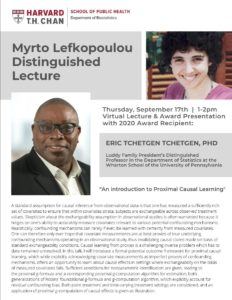 We are extremely pleased for Department alumnus Dr. Eric Tchetgen Tchetgen, PhD ’06, to present the 2020 Myrto Lefkopoulou Distinguished Lectureship later this week.
We are extremely pleased for Department alumnus Dr. Eric Tchetgen Tchetgen, PhD ’06, to present the 2020 Myrto Lefkopoulou Distinguished Lectureship later this week.
Please join us for his virtual lecture on:
Thursday, September 17, 2020 | 1-2pm | Via Zoom
An Introduction to Proximal Causal Learning
A standard assumption for causal inference from observational data is that one has measured a sufficiently rich set of covariates to ensure that within covariates strata, subjects are exchangeable across observed treatment values. Skepticism about the exchangeability assumption in observational studies is often warranted because it hinges on one’s ability to accurately measure covariates relevant to various potential confounding mechanisms. Realistically, confounding mechanisms can rarely if ever, be learned with certainty from measured covariates. One can therefore only ever hope that covariate measurements are at best proxies of true underlying confounding mechanisms operating in an observational study, thus invalidating causal claims made on basis of standard exchangeability conditions. Causal learning from proxies is a challenging inverse problem which has to date remained unresolved. In this talk, I will introduce a formal potential outcome framework for proximal causal learning, which while explicitly acknowledging covariate measurements as imperfect proxies of confounding mechanisms, offers an opportunity to learn about causal effects in settings where exchangeability on the basis of measured covariates fails. Sufficient conditions for nonparametric identification are given, leading to the proximal g-formula and a corresponding proximal g-computation algorithm for estimation, both generalizations of Robins’ foundational g-formula and g-computation algorithm, which explicitly account for residual confounding bias. Both point treatment and time-varying treatment settings are considered, and an application of proximal g-computation of causal effects is given as illustration.
Dr. Tchetgen Tchetgen is a graduate of the Department of Biostatistics at the Harvard T.H. Chan School of Public Health, having received his PhD in 2006 upon defending his dissertation on “Statistical Methods for Robust Inference in Causal and Missing Data Models” under his advisor Dr. Jamie Robins. After receiving his PhD, he was a Yerby Fellow at the School from 2006-2008 before serving on the faculty from 2008-2017. In 2018 Dr. Tchetgen Tchetgen was named the inaugural Luddy Family President’s Distinguished Professor in the Department of Statistics at The Wharton School of the University of Pennsylvania. He remains an Adjunct Professor of Biostatistics and Epidemiologic Methods at the Harvard Chan School.
Dr. Tchetgen Tchetgen has distinguished himself as one of the leading young biostatisticians and epidemiologic methodologists in the world, having made numerous influential contributions to the development and application of statistical methods for missing data, causal inference, and semiparametric regression in social, genetic and infectious disease epidemiology.
In addition to his myriad of research accomplishments, Dr. Tchetgen Tchetgen is a talented and inspiring teacher and mentor who has published over 140 papers in top statistical and epidemiological journals, produced an impressive record of grant funding, and has generously and tirelessly served the statistical profession, both nationally and internationally. He is a hardworking, creative, and well-respected leader, and through his statistical talent, has dedicated his career to advancing public health.



